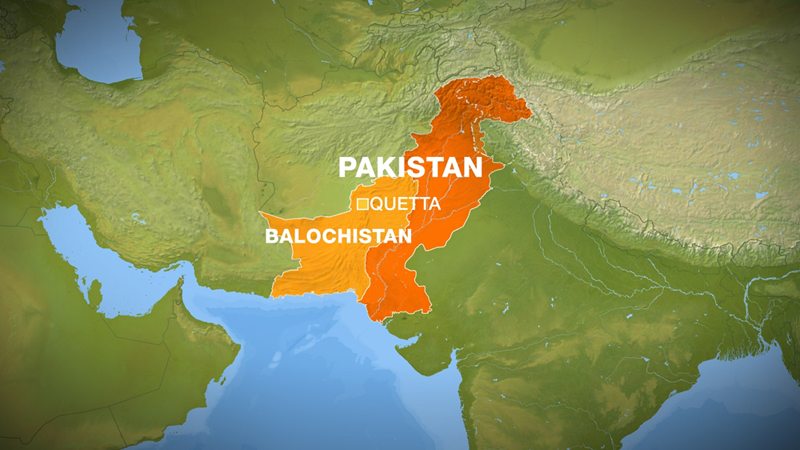There seems to be a serious dearth of imagination while searching for solutions on Balochistan
As Dr Pervez Hoodbhoy recently wrote, “Men like Rohrabacher are no friends of the Baloch. But what can stop their meddling? The answer can only come once we dump the myth of Pakistan being one nation, one people”. The continuous undermining of Pakistan’s pluralism, citizenship rights and quest for self-rule has led to a situation where Pakistani flag is not welcome in many parts of its largest and most neglected province.
This is not the first time that the country has faced a dire situation. In 1971, we were faced with a similar dilemma and the civil-military elites of West Pakistan bungled. Their mishandling was exacerbated by an external intervention and for years we have been fed with stories of how all was hunky dory in the more populous wing of Pakistan until the evil ‘Hindu’ India destroyed the ‘Muslim’ Pakistan.
It takes a questionable resolution tabled in the US Congress by Dana Rohrabacher, an extremist republican with a dubious past, to alarm the mainstream Pakistani politicians and media about the plight of Baloch people. Yet again, a ‘conspiracy’ to disintegrate the land of the pure has been reiterated. The good part is that Balochistan issue – something that the media was afraid to talk about – has become a subject of prime-time, and sometimes ill-informed, discussions on national television.
We cannot absolve ourselves of the decades-long discrimination that the province and its people have faced due to a variety of reasons. Whether it is the misuse of its natural resources such as natural gas, gold, etc, or its leverage in the federal power structure, the scorecard is pretty grim. In real terms, the issue of provincial autonomy has only been resolved recently via the 2010 eighteenth amendment. But even that seems to fit the clichéd description of being ‘too little and too late’ given how the Baloch nationalists view it.
Historically, the civilian and military rulers have been trigger-happy when it came to Balochistan. For instance, the initial dispute of Kalat’s forced inclusion into Pakistan is an open question and it was never resolved. In 1972, the ‘elected’ leader Zulfikar Ali Bhutto started an operation to crush an insurgency. General Zia offered carrots to the Baloch tribal leaders and kept things under central ‘control’ without any move towards resolving the fundamental issues: self-rule, resource distribution, and development.
But the fourth military rule under General Pervez Musharraf embarked on a mega-modernity project ignoring the history, alienation and festering wounds of the local people. Ambitious plans to introduce “modern” policing systems (ironically based on the colonial policing structures that the British left us), development and completion of the Gwadar Port, highways connected to Cantonments were part of this package from Islamabad.
The Baloch rejected this paradigm and thus began another operation against the locals. The year 2006 was the highpoint of this struggle when the 80-year old Nawab Akbar Bugti (ironically always a pro-federation politician) was brutally killed in a cave. Trumpets were blown and Musharraf is on record to have said that he will teach others a lesson.
This was the turning point and the low-grade insurgency has now turned into a full-scale war against the might of Pakistani state – its security agencies. This has not come without some unfortunate developments such as the killings of non-Baloch civilians and more worryingly teachers thereby further denuding the prospects of education for the young as many teachers in the province are Punjabis and Mohajir.
While the state – especially the military – deny that such ‘operations’ are underway, the media, especially the social media, have been reporting gruesome tales of abduction, torture and murders of many young Baloch nationalists.
The tragedy is that the strategy of the state and the militants both appear to be patently flawed. The Pakistani government has yet to show credible evidence of Indian or US involvement in Balochistan. The lack of transparency in dealing with the province has become a major farce. The Interior Minister’s media-bravado is no longer taken seriously and no one believes what the security establishment says. There seems to be a serious dearth of imagination while searching for solutions.
On the other hand, the leaders of the Baloch people (incidentally most of them are tribal chiefs) are making open appeals to India, US and the world powers to intervene. But this can only feed into a vicious cycle of state repression. The US will not do anything for Baloch out of love for their autonomy and would keep its interests before those of the Baloch. And sidelining Pakistan and its powerful Army is not on the US agenda. It requires no rocket science to understand that, Congress resolutions notwithstanding.
Balochistan is a complex issue where history, geography intersect with the imagined notions of a centralised, nationalist Pakistan. It is time to reconsider that and find ways, which can lead to meaningful engagement with the Baloch nationalists. For that to happen, the security operations must end immediately, resource distribution formulae be worked out, commissions be set up to investigate the brutalities and if needed a constitutional amendment be introduced to enhance autonomy or even reconfigure it. This Parliament has undertaken historic constitutional reforms via 18th, 19th and 20th amendments. Why not a 21st Amendment?
This piece was published by The News on March 4, 2012.



